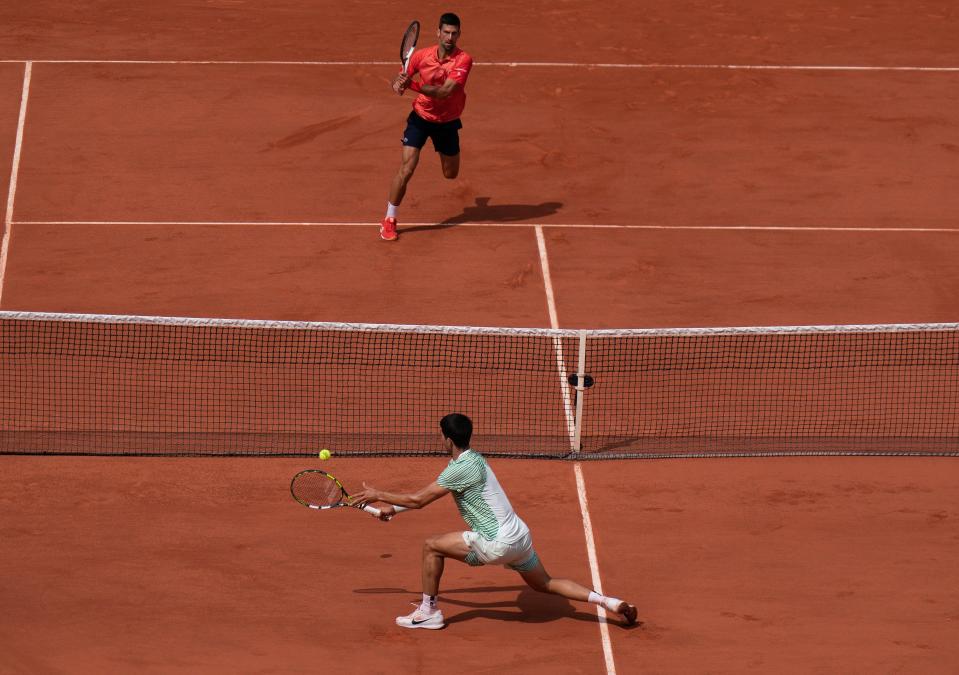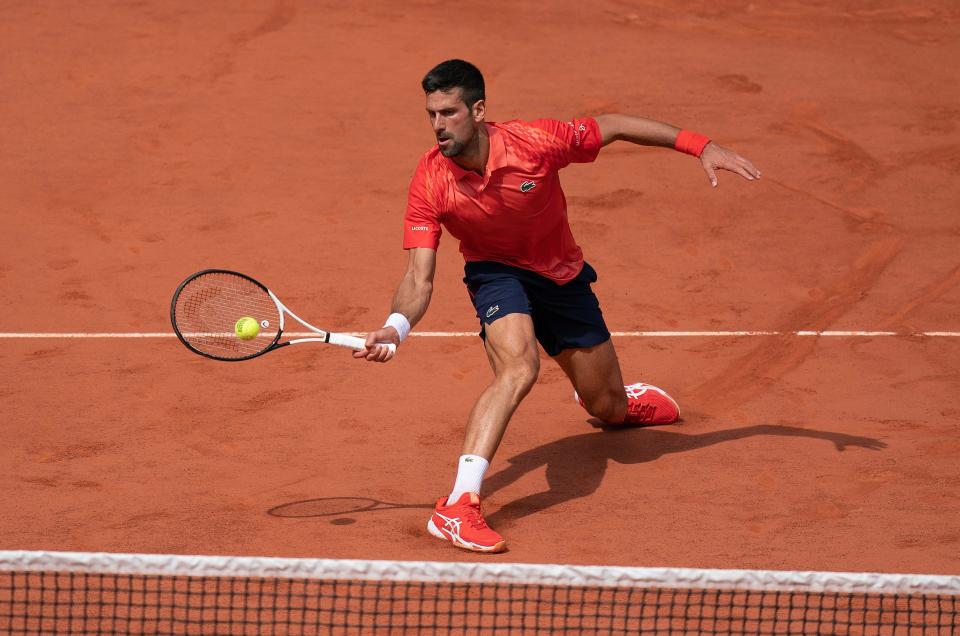Novak Djokovic proves he can still weather rigors of tennis in French Open semifinal win
It is impossible to say in tennis where the breakdown of the body begins and the mind ends and which one goes first under the heat of history.
But when that moment comes — and it has come for everyone trying to unseat one of the sport’s three unquestioned legends over the last two decades — it arrives in the form of a question.
How much suffering can you take?
When that question was posed Friday to Carlos Alcaraz, the 20-year-old phenomenon who is already a Grand Slam champion but not yet the conquerer he seems destined to become, the answer looked too familiar.

Was it nerves? Was it dehydration? Or was it Novak Djokovic simply doing what he’s done for the last dozen years, standing tallest while his would-be replacements continue to wilt?
It was likely a bit of all three. But after Djokovic’s 6-3, 5-7, 6-1, 6-1 victory to launch him into yet another French Open final, we know the torch is not ready to be passed.
Maybe that will happen later this summer or next year. At 36, Djokovic knows tennis mortality is just around the corner the way it was for both the now-retired Roger Federer and the chronically injured Rafael Nadal at the same stage of their careers.
But the well has not yet run dry. And it’s going to take a lot more than what Alcaraz produced in Friday’s semifinal to take over this sport. Djokovic, the No. 3 seed, will face Casper Ruud of Norway on Sunday after the No. 4 seed dismantled Alexander Zverev 6-3, 6-4, 6-0 to reach his second consecutive French Open final.
A match that held ridiculous promise for two hours turned on a dime early in the third set when the top-seeded Alcaraz began to cramp. It manifested at the end of the second game when Alcaraz shook his right hand as if in some discomfort. Then, after shanking a ball into the net, he came to a full stop and essentially couldn't move.
Right before that moment, it seemed that the match had turned in Alcaraz’s direction. He had begun to find his rhythm in long rallies and was deploying his power to punishing effect. On the heels of Alcaraz winning the second set, it seemed Djokovic was the one about to endure one of the biggest stress tests of his career.
And then, just like that, the match was essentially over. The cramps were so bad that Alcaraz, unable to take a medical timeout under the rules because he was not actually injured, had to forfeit his service game just to get a few minutes of hydration. When he came back, he wasn’t the same player. Djokovic won the next 10 games without having to try very hard.

It was the worst way a potentially great match could end. It was also highly illustrative of how years of muscle memory and being in these crucibles against Federer and Nadal have forged Djokovic into a competitor that you cannot beat merely with forehands and backhands.
You have to take his body, and perhaps most difficult of all, you have to plant doubt in his mind. After 22 Grand Slam titles, with a record-setting 23rd likely coming on Sunday, that’s a difference Alcaraz should now fully understand.
From afar, and without the benefit of being in his body, this was about more than fitness and an unusually warm Parisian afternoon. In last year’s U.S. Open quarterfinal, Alcaraz outlasted Jannik Sinner over 5 hours, 15 minutes in one of the most brutally physical matches you’ll ever see. He still had enough in reserve to win the title.
But that was against a peer. This was against Djokovic, and even though the first two sets did not seem unusually punishing, the occasion had clearly taken its toll.
The annals of tennis history are filled with generational battles like this, but usually, it’s the old guy fighting off the aches and pains, trying to calm the nerves and limit the lapses in concentration.
But Djokovic, more than any other player we’ve ever seen, is a master at managing his game and his energy in a best-of-five marathon. He knows when to push. He knows when to concede games or even sets so that he has something left for the end. In the most pressure-packed moments, he somehow finds a way not to miss.
The most notable exception of recent vintage was the 2021 U.S. Open final when he lost his bid for the calendar Grand Slam rather meekly to Daniil Medvedev. Throughout that tournament, Djokovic had been pushed into fourth and fifth sets, expending so much energy and consumed by the pressure of history that there was nothing left of him by the final.
Should that situation arise again this year — and he’s the undeniable favorite to win both his third French title Sunday and his eighth Wimbledon next month — he will almost certainly handle it better.
But so will Alcaraz.
We have seen ever since he arrived on the scene that Alcaraz is more than just blazing speed and aesthetic flourishes. He’s a competitor of the highest order with a thirst to accomplish great things in the game. He’s already got a heck of a head start.
This was the first time the young Spaniard has faced Djokovic at a Grand Slam, but it’s almost certainly not going to be the last. Another meeting in the Wimbledon or U.S. Open final later this year seems more likely than not.
If that match produces five sets of what the first two hours Friday portended, we won’t have to wait long to get a generational battle worthy of the moment.
This article originally appeared on USA TODAY: Novak Djokovic answers biggest question in French Open semifinal win

 Yahoo Sports
Yahoo Sports 
